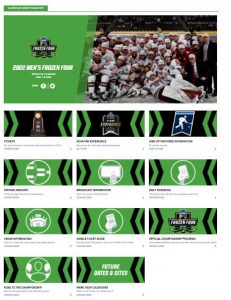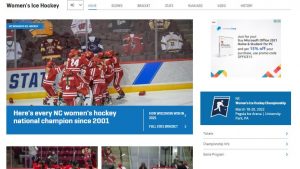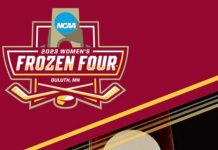Nicole: Halloween may be over, but we’ve got a special treat this week as Gabriella Fundaro joins me as a Guest Contributor to Wednesday Women. Gabs writes about women’s college hockey at The Ice Garden and has been covering the sport for various outlets for 10 years.
Gabs and I both wrote this week about the NCAA Gender Equity Review report that came out on Monday. The report detailed the many differences in the way the NCAA supports men’s and women’s championships, from signage and advertising to differences in tournament selection protocol. It’s all required reading as far as I’m concerned, but she and I also agreed there was plenty more to talk about than what either of us could cover in a single article.
This review came about after women’s basketball players took to social media to show the inadequate set up they were provided in their championship bubble. Those posts went viral and forced the NCAA to respond because the noise became too loud to ignore.
The inequities that exist between men’s and women’s hockey aren’t new, but the sport hasn’t had a moment like that where people with enough clout pay attention and join the fight. The report showed how the NCAA had already failed to follow through on internal reviews of places they were falling short, so I’m not particularly convinced that anything will come out of this, either.
I said on Twitter after it was released that I wish there had been a more deliberate roll out of the information the report contained. It would have been super impactful if each day they released the details of specific sports so that the headlines every day for a week were about the ways the NCAA was failing its athletes. The impact of seeing disparate spending figures, staffing and promotion would have been really impactful.
With the report coming out all at once, each individual sport covered the issues and information relevant to them, but I feel like we missed out on an opportunity to have a much bigger impact.
We’ve both been to numerous Frozen Fours, so none of this was new information to either of us, but Gabs, I wondered if any one piece of data surprised or stood out to you?
Gabs: I think I was most surprised by the review’s finding that sports that produce the most revenue on one side (all men’s championships) feature the deepest inequities for their women’s counterparts–meaning that women’s hockey players are facing some of the greatest resource disparities.
I’m slightly confused by the NCAA’s logic here. No athlete should have to suffer through fewer resources and subpar playing experiences just because their sports don’t churn up enough cash, but from a purely business perspective, the NCAA appears to be hampering itself. If you can make money off of a men’s tournament–one that is by nature well-established and has had decades upon decades to grow–it stands to reason there’s potential for that sport’s women’s tournament to make money as well, with more investment and time to grow.
Instead, the NCAA has chosen to compound the disparities that already exist by investing more resources and dollars into sports that are already successful–primarily men’s sports–and capping those same resources for sports that are still growing. That includes women’s ice hockey.
I guess I was also surprised to learn that the disparities were so great for women’s ice hockey, compared to other sports. I always thought, in the back of my mind, that the smaller resource pool and sparser promotions were due to the nature of hockey in general. It’s a pretty niche sport, even on the men’s side. But it turns out the experiences for folks involved in NCAA men’s hockey and NCAA women’s hockey are starkly different.
The shame of it is that NCAA women’s hockey will never be able to grow unless those inequities are addressed. The review spells this out pretty plainly (and we’ve of course seen this firsthand at Frozen Fours), but the Division I men’s Frozen Four and Division I women’s Frozen Four are held in arenas of very different sizes. It makes sense that more resources are needed to run a tournament in an NHL arena compared to an on-campus rink (the report notes this might explain the much larger budget for signage for the men’s championship), but if you continuously hamper women’s hockey by holding it in smaller arenas with fewer promotions, then how do you expect it to ever produce revenue for you? Is there an organization in the world that would expect to see the same return on investment on budgets of $4.2 million and $656,827?
The report expressed reason for optimism based on “the NCAA’s recent efforts”. Phase I of the review was released a few weeks ago; following that initial report, the NCAA took a few steps already to address some glaring inequities. That’s all well and good. But as you mentioned, Nicole, the NCAA only agreed to launch an independent review of its championships after women’s basketball players took it upon themselves to showcase the disparities live from their March Madness bubble.
I’m going to be much more cautious about my optimism, knowing that. Women’s basketball players never should have been faced with that burden–nor should any athlete in the future. Yet I fear that’s the only meaningful way to garner mainstream attention and hold the NCAA to account. I hope that NCAA administrators will do what’s right and address some of the things called out in the ice hockey case study immediately, without women’s hockey players needing to pick up the burden themselves.
Beyond just straight budgetary numbers, the areas to address are aplenty. I’m curious, is there anything in particular you’d want the NCAA to change or fix immediately in regards to the women’s ice hockey tournament (whether it was explicitly mentioned in the report or not)?
Nicole: Well I could (and probably should) write a whole column about this. So many of my thoughts and ideas kind of inform and rely on other things, so I’m going to try to get this in some semblance of order, but my apologies in advance if things get a little convoluted.
It was a step forward to have the National Championship game televised on ESPN this year, but the first semifinal was only streamed on ESPN+ and the quarterfinals are streamed on NCAA.com with dubious quality of video, audio and commentary. There are a total of seven games in this tournament and there’s no way that anyone that’s not already a fan is watching most of them.
Additionally, the games that were televised featured commentary that was rudimentary at best. Just because someone knows hockey doesn’t mean they know women’s college hockey. I was appreciative that ESPN had some articles online leading up to the games this year, but what they published had numerous errors. And the broadcasters used those articles are part of their prep, so they just repeated the wrong information. The entire broadcast was perfectly fine, but in a year when it finally reached a bigger audience, there was an opportunity to really showcase the sport and the teams. It is just so disappointing to know how many great stories and players there are and to see the same five facts about the Patty Kaz and the coaches get trotted out.
I just tried to find information about this year’s tournament, and couldn’t, no matter how many different ways I Googled it. Tickets are already on sale for the men’s tournament and the championship home page has link after link with information. The women’s page has a tiny sidebar and the links take you to general NCAA pages that don’t actually have anything about women’s hockey on them.


The men’s tournament is a destination that ends up basically being a men’s college hockey convention. It’s a celebration of the game as people buy tickets and plan to go whether or not their team will be there. It would be amazing to have even a sliver of that kind of atmosphere at the women’s tournament. The conference commissioners don’t even go to the women’s championship because they are all at the men’s conference tournaments that happen the same weekend. I have no idea how anyone thinks this sport can grow when it feels like even the people that are paid to care, just don’t. It’s so disheartening and adds to the feeling that the women are an afterthought.
As there are rules about the size of the arena to be used, the women’s tournament has been relegated to a small handful of campus sites and unfortunately, many of those are simply not easily accessible. Minneapolis has hosted a number of tournaments, but the rest have been held in much smaller towns. Where the women play this year in State College, PA, the men are in Boston. The past few years, the women have played in Erie, PA, Hamden, CT and Durham, NH. It’s difficult and expensive for me to get there to cover the games, so I can’t imagine it’s any easier for fans or people new to the game.
Before we move on, did I miss anything you’d like to see changed?
Moving into current action, the Ivy League schools have all started their seasons, so we’re finally all back on the ice, which feels like such a blessing. We can talk about specific teams, but I also wanted to ask about your take on the season so far and what teams you’ve been keeping an eye on.
Gabs: There are a few things on my list, although you touched on most of the big ones! You hit the nail on the head about the two different atmospheres we’re dealing with; a “men’s hockey convention” is a very apt description for the men’s Frozen Four. The location is definitely a huge part of that. Men’s Frozen Fours have even been held in places where there is no Division I college hockey team; Tampa in 2016 comes to mind.
Women’s Frozen Fours are almost always tied to campus host sites, so there isn’t a real possibility of going outside the box and picking a place that’s going to be a big draw as a standalone destination. The women’s host sites for this next cycle in 2023-26 (Duluth, MN, Durham, NH, Minneapolis, MN, and University Park, PA) will also have hosted multiple times, so the appeal just isn’t the same. And I don’t need to tell you this, but one of the best possible campus sites is continuously passed over for a women’s Frozen Four: Madison, WI. The women’s arena is too small to host but the Kohl Center, where the men’s team plays, is too big (I guess). Madison would be a fun place, a new place, and would assuredly draw strong crowds, but can’t seem to win a bid.
The Gender Equity Review noted this, but the atmosphere at each championship, regardless of location, is very different, too. Most notably, the men’s Frozen Four gets a fan fest while the women’s does not. I would love to see the NCAA invest in more programming around the weekend for the women’s Frozen Four to up the excitement level for fans. Boston University sadly did not get to host in 2020 because of the pandemic, but they were set to host a women’s sports media roundtable that weekend to engage the campus community. This is one very small example, but it would have made for an interesting addition to an already great weekend of hockey, and it’s not a concept that’s difficult to repeat from year to year.
It would also be fantastic to raise the profile of the first round of the tournament. Typically all four quarterfinal games are played a week before the Frozen Four; the high seed hosts. These games are never nationally televised and instead are streamed through NCAA.com. They’re often played on the same time and at the same time. And that’s a real shame, because some of the most nail-biting, exciting hockey happens in those games. This is purely anecdotal but for more casual fans who don’t follow Division I women’s hockey super closely, I think it helped them follow along this past year when the quarterfinals happened the same week, at the same site as the Frozen Four. It felt like one cohesive event. It certainly helped national media like yourself provide coverage for the entire tournament.
Anyway, you brought up this year’s actual hockey games, so let’s talk actual hockey games. I’m thrilled that we have the Ivy League back in action and we have a true season once again. The Ivies have played a maximum of two weekends so far, but there’s already a lot we’re learning about them. And there is a lot to learn about those teams; so much has changed for them since the spring of 2020.
Cornell, who won the Ivy League and the ECAC regular season in 2020, has faltered a bit out of the gate. None of that is particularly surprising; I can’t think of a team in recent memory that’s lost more than the Big Red did from their 2019-20 squad. Their top lines and their top-four defensive core have all since graduated or moved on. That’s an impossible amount for any team to replace, even in what’s technically been two offseasons. In their first weekend, after a loss against Mercyhurst, the Big Red fought back to secure a 4-0 win in game two; they failed to rebound the same way this past weekend in ECAC play. After losing to Harvard, they fell to Dartmouth. Both are teams who I expect to improve on their 2019-20 performances; it’s a telling marker of where the Big Red are at early on, though.
Yale, which in 2019-20 had its first season above .500 since 2006-07, is another team that I think could push their ceiling even higher. They’re 2-2 so far, with both losses coming this past weekend against two top-10 teams in Princeton and Quinnipiac. They definitely controlled the run of play for stretches this weekend; they’ve still got to figure out a way to convert and score goals, but the pieces are clearly there.
Similar to Cornell, Princeton is another top Ivy League team with a few question marks. Sarah Fillier, who’s been their offensive driver for the past two seasons, is centralized with Team Canada. The Tigers also graduated their No. 1 defender and a 30-goal scorer. It feels like much of this season for them will be determined by just how many goals junior Maggie Connors can pile up without her line mates of the past two years; with three this weekend, she’s taking care of that so far. It’s far, far too early yet to make any judgments about stats, but I wonder if those absences end up hurting Princeton the most on the power play. They were 1-for-7 this weekend, off the pace they’ve been accustomed to scoring at with a player advantage.
You asked who else I’ve been keeping an eye on this season. I’ll answer with Quinnipiac and Northeastern, for two different reasons. Hardly anyone had the Bobcats pegged as a preseason contender but I think they’re going to make a lot of noise as the season progresses. So far, they’ve been up to task with an 8-0-2 record. They have genuine scoring talent, a strong goaltending tandem, and depth at both skater positions. They opened ECAC play this past weekend with wins over Brown and Yale; I’m excited to get into the thick of conference action to see what Quinnipiac does against teams like Colgate, Princeton, and Clarkson.
I’ve been watching Northeastern closely, too, ever since their very out of character weekend early on, where they fell to both Boston University and Providence. The Huskies have been better since then, though it felt like they were still missing a bit of their bravado up until last weekend. I think that’s pretty understandable for a team without Alina Müller, their top forward and perennial Patty Kaz nominee, but they’re definitely on the upswing. Their weekend sweep over Boston College seemed to be proof they’ve regained their full confidence and are back in control of the Hockey East race.
On the flip side, those were tough games for the Eagles to drop. They came into the weekend actually ranked ahead of Northeastern in the polls; it seemed like a great chance for BC to take a bite out of the Huskies’ conference title hopes and assert themselves firmly as a team to beat. Instead, they couldn’t quite do enough to earn a win, and ended up falling especially flat on Saturday with a 3-0 shutout loss. Are there any similar missed opportunities for teams you’ve noted this season? Have you been surprised by Northeastern’s early-season losses, or a slow start for any other team?
Nicole: I feel like Clarkson’s non-conference schedule could come back to bite them when we get to the end of the season. They’ve won their conference matchups so far and maybe they’ll just go through the ECAC and win the auto bid and it won’t be an issue, but it’s hard not to look at the tie with Syracuse and the tie and loss to Bemidji and not think about how those will affect their strength of schedule and quality win points.
It may not be in exactly the same category, but Penn State has a number of one-goal losses already, as well as two ties. Their first four games against St. Lawrence and Boston College looked to be a chance for them to make a statement and prove they were overlooked last season, but ended up with three one-goal losses and a tie. I just think they’d be a different team with the confidence and momentum of a couple of wins there.
And I think Providence has one of those stretches coming up. They got that great win over Northeastern and haven’t carried that into some non-conference games. They clearly have the talent and ability. They have to make some waves in their next four games – two against Northeastern and then two against BC.
It’s hard to hold teams accountable for our own expectations, especially in a year like this one with so many variables, but I do think there are some teams that look really good on paper and haven’t quite found their stride yet.
Northeastern’s start is definitely the surprise of the season so far for me. On paper, they looked like they’d be picking right back up where they left off in March – in better shape than they probably planned on, since I think they assumed a number of their players would be centralized.
While I’m well aware of how good Müller is, I really didn’t expect the team to flounder as much as they have with her on the bench. It’s not just her scoring or passing they seem to be missing, but her leadership and presence on the ice. It seems like other players have stepped up to provide the offense, but as we saw from her exuberance in the stands at Worlds, Müller brings energy and enthusiasm and it’s infectious. I’m not sure that can be recreated.
Another team that isn’t yet quite as good as I thught they’d be on paper is Minnesota Duluth. I think we were all so focused on the addition of Elizabeth Giguere that we didn’t account for how big a loss Ashton Bell was. The offense took a few weeks to really gel, but seems to be settling in. They’ve been less successful at keeping teams off the board on the other end. So far, they’ve mostly been able to be prolific enough on offense to offset the seemingly weaker defense, but it’s a fairly narrow margin and I’m not sure that’s something they want to bank on all season long.
I think Clarkson fits in this category, too. They’ve been less consistent than we’re used to from them and I thought they’d be really strong on offense – which they have in some games. But they managed just one goal in four of their games so far. Their goals against is a respectable 1.10, but I really thought they’d be putting up three or more goals most games and that has not been the case.
On the other side, there have been some delightful surprise teams so far this season. I could not be more excited to watch Dartmouth as the year goes on, which I’m certain is not a thing I’ve ever said in my time covering the sport (Sorry, Big Green!). It’s amazing to see a new coaching staff make a difference immediately and I think that’s the case here. Liz Keady Norton was a great hire and I expect even more good things from this program while she’s at the helm.
RPI is definitely succeeding on the back of another shutdown goalie in Amanda Rampando, but they have an improved offense and that has made a big difference.
Has anyone else exceeded your expectations so far?
Gabs: There are definitely a few teams. UConn has impressed me early on in Hockey East play; they haven’t had the toughest schedule to start the year, but this appears to be a group that could raise the bar higher for their program. They’ve already rewritten the UConn history books–they’re the first Huskies team to start with a 7-0-0 record.
They stumbled a bit with a 3-0 loss to Merrimack this weekend, but rebounded with an overtime win at Vermont. UConn is an intriguing team to me because of the talent they return in their fifth-year players, namely Natalie Snodgrass and the Wabick twins. Summer-Rae Dobson was also a notable offseason transfer. We’ve seen UConn put together Hockey East tournament runs before; I’m curious to see what they can do against some of the league’s top competition with all of the pieces they have.
I’ve also been pleasantly surprised with Union’s play at times, though they have yet to pull off a big win. They do have a 2-2 tie against Mercyhurst to their name, though, and they pushed then-No. 9 Providence to the brink in a 2-1 loss. I do not expect them to be in the ECAC playoff conversation at all, but they’ve kept it close against a few good teams, despite losing six of their seven top scorers from 2019-20 and missing the entirety of last season. For a team that had been on the uptick–they had their best season two years ago with a ninth-place conference finish–those are the performances you hope to see so you can continue to build.
Harvard is another team I’d put in this category. They’re not exactly exceeding expectations, but that’s only because with the talent they have, I have them right in the mix of the ECAC race. So far, the Crimson are living up to that billing. They’re 2-1 in conference play, with sizable wins over Dartmouth and Cornell and a 5-4 loss to Colgate, who looks to be the team to beat early on.
There are some players who are standing out for me early on, too. Dara Greig was a little bit of an under-the-radar transfer pickup, but she’s been quite an important piece for Colgate up front with five multi-point games so far. Senior Courtney Correia at Boston University has helped fill some gaps in offensive production left by departed players; she’s well on pace to snap her career-high for points. It’s early for the Ivys, but Charlotte Welch looks very good for Yale. She was nearly a point-per-game player as a sophomore and I think she could surpass that for the Bulldogs this year and feature as a more dynamic playmaker.
Which individual performances have stood out to you so far?
Nicole: I was also thinking about Dara Greig. She was not getting a lot of time on the ice at Wisconsin, so I’m excited for her to find a new home where she seems to be flourishing. Her teammate Kalty Kaltounkova was impressive as a rookie last season and seems only to have gotten better this year. She’s a player I think we’re going to enjoy watching grow over the next few years. She’s so big and solid and still really smooth and agile on the ice.
Vanessa Upson was just named Rookie and Forward of the Month in the CHA. It feels like we’ve had some phenomenal breakout rookies in the CHA in the past few seasons and it might be her turn. Her teammates Sara Boucher and Kristy Pidgeon are also having great starts to the season.
I’m always impressed by first-year players that slot into their teams and get up to speed quickly. Wisconsin’s Sarah Wozniewicz has added more depth for the Badgers, standing out on their third line and making them an even tougher team to match up with up and down the line chart.
I feel like Sadie Peart of Quinnipiac has taken on a bigger role this season. She was third on the team in scoring as a rookie with 12 goals and 12 assists in 37 games. Through 10 games this season, she’s already racked up 6 goals and 9 assists. She seems to have grown in her confidence, ability and leadership.
It’s still early going, so I’m sure we’ll continue to see players separate themselves and show off. If you’d have asked me to guess who the 10 scorers would be so far, I’d probably only gotten two or three of them right. I’m actually really excited about that – I love seeing players step up and into new roles and new stars emerge. It says nothing but good things for now and the future of the sport.


